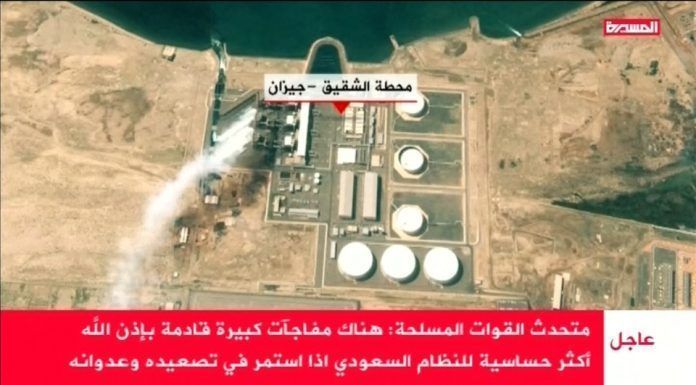CAIRO, June 19 (Reuters) – Yemen’s Iran-aligned Houthis struck a power station in Saudi Arabia’s al-Shuqaiq city, in the southern province of Jizan, with a cruise missile, their Al Masirah TV said on Wednesday, but there was no immediate confirmation from Saudi authorities.
U.S. officials said they were aware of reports of a missile strike on the kingdom’s “critical infrastructure”, but gave no details of possible damage or casualties.
The Yemen conflict is widely seen in the region as a proxy war between Saudi Arabia and Iran, but the Houthis have denied taking any orders from Tehran and say they took up arms against corruption.
The Houthis, who ousted the Saudi-backed internationally recognised government from power in Sanaa, the capital, in late 2014, have stepped up missile and drone attacks on Saudi Arabia in recent months as tension rises between Iran and the United States.
In Washington, White House spokeswoman Sarah Sanders said President Donald Trump had been briefed on the reports of a missile strike in Saudi Arabia.
“We are closely monitoring the situation and continuing to consult with our partners and allies,” she added.
Pentagon spokeswoman Navy Commander Rebecca Rebarich said such attacks were “a significant cause for concern and (put)innocent lives at risk”.
Washington and Riyadh have blamed Tehran for attacks on two oil tankers in the Gulf of Oman last week and four ships off the United Arab Emirates last month, both near the Strait of Hormuz, a major conduit for global oil supplies. Iran has denied responsibility.
The Houthis also targeted two Saudi oil pumping stations last month, and a Houthi attack last week on Saudi Arabia’s Abha airport wounded 26, Saudi authorities said.
To counter Iran‘s threats, the U.S. military has sent forces including aircraft carriers, B-52 bombers and troops to the Middle East. But the United States, Iran and Saudi Arabia have all said they do not want a war in the region.
(Reporting by Nayera Abdallah in Cairo and Steve Holland and Phil Stewart in Washington, Writing by Stephen Kalin, Editing by Jonathan Oatis and Clarence Fernandez)


